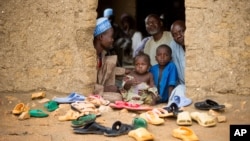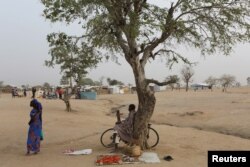Food shortages in northern Cameroon are raising tensions between local communities and Nigerian refugees displaced by the Boko Haram conflict.
As a quarrel erupted between hawkers at the food market near the Minawao refugee camp, 17-year old Paul Sibane accused a Nigerian refugee of stealing his money. He said he would rather settle the issue himself because he believes police are biased in favor of refugees.
At the local police post, officers said they were not authorized to comment, but they added that disputes between refugees and local residents are growing more common.
U.N. aid agencies have been carrying out activities to sensitize refugees and host communities, and to promote peaceful conflict resolution, but tensions remain.
Njenabu Jani lives in Aramba village, six kilometers from the refugee camp. She said she lost six of her goats in the past month. She suspects refugees who visit a nearby stream for water.
She said local authorities have not pursued the villagers' complaints and that the villagers have decided to beat any refugees caught stealing.
Meanwhile, the refugees say they are struggling as local water and food resources are stretched thin.
The Minawao camp and surrounding communities are home to about 75,000 Nigerians who fled Boko Haram violence. The conflict spilled over into northern Cameroon more than two years ago. The insecurity has hurt farming and trade.
In January, funding shortfalls forced the U.N. World Food Program to cut rations for refugees at Minawao by 25 percent. U.N. staff told VOA the reduced rations are expected to continue until new funding arrives in June.
Falmata Moustapha, who has lived at the camp with her four children since 2015, said after rations were cut, she decided to pull her two oldest children from school to send them to nearby wild bushes and farms to forage for food and water. She said they are eating just one meal a day and they are very hungry.
Aid workers and educators at the Minawao camp said they have seen as much as a 50 percent drop in school attendance.
Nigerian-born teacher Moussa Lava leads his class in their lessons.
"They do not participate in the class because they are facing some problems like lack of clothes, lack of something to satisfy their needs at home," he said. "You can see children, 40 in the class today. Tomorrow you will see them 20 or 15 only. And that one is a challenge to the teacher."
The government says just one third of the $690 million needed to meet the needs of displaced people and host communities this year has been received.





